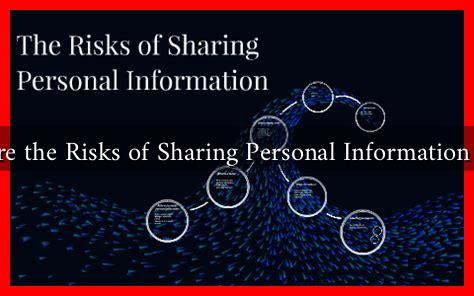-
Table of Contents
What Are the Risks of Sharing Personal Information Online?
In today’s digital age, sharing personal information online has become a common practice. From social media platforms to e-commerce websites, individuals often provide sensitive data without fully understanding the potential risks involved. This article explores the various dangers associated with sharing personal information online, highlighting the importance of safeguarding your data in an increasingly interconnected world.
The Landscape of Online Sharing
With the rise of social media and online services, the amount of personal information shared online has skyrocketed. According to a report by the Pew Research Center, approximately 70% of Americans use social media, and many share personal details such as their location, interests, and even financial information. While this connectivity can foster relationships and enhance convenience, it also opens the door to numerous risks.
Types of Risks Associated with Sharing Personal Information
Understanding the types of risks associated with sharing personal information online is crucial for protecting oneself. Here are some of the most significant risks:
- Identity Theft: One of the most alarming risks is identity theft, where criminals use personal information to impersonate individuals. According to the Federal Trade Commission (FTC), there were over 1.4 million reports of identity theft in 2020 alone.
- Data Breaches: Companies that collect personal information are often targets for cyberattacks. High-profile data breaches, such as the Equifax breach in 2017, exposed the personal information of 147 million people, leading to significant financial and emotional distress.
- Online Harassment: Sharing personal information can lead to online harassment or stalking. For instance, individuals who post their location or personal details may become targets for unwanted attention or threats.
- Financial Fraud: Sharing financial information, such as credit card numbers or bank details, can lead to fraudulent transactions. A study by Javelin Strategy & Research found that in 2020, consumers lost $56 billion to fraud.
- Reputation Damage: Once personal information is shared online, it can be challenging to control its spread. Inappropriate photos or comments can resurface and damage an individual’s reputation, affecting personal and professional relationships.
Real-World Examples and Case Studies
Several high-profile cases illustrate the risks of sharing personal information online:
- The Target Data Breach (2013): Hackers gained access to the credit and debit card information of over 40 million customers during the holiday shopping season. This breach highlighted the vulnerabilities of sharing payment information online.
- Facebook-Cambridge Analytica Scandal (2018): Personal data from millions of Facebook users was harvested without consent for political advertising. This incident raised awareness about data privacy and the consequences of sharing personal information on social media.
- Celebrity Hacks: Numerous celebrities have fallen victim to hacking incidents where personal photos and information were leaked online. These cases serve as a reminder that even public figures are not immune to the risks of sharing personal information.
Protecting Yourself Online
While the risks of sharing personal information online are significant, there are steps individuals can take to protect themselves:
- Limit Sharing: Be mindful of the information you share on social media and other platforms. Avoid posting sensitive details such as your address, phone number, or financial information.
- Use Privacy Settings: Familiarize yourself with the privacy settings on social media platforms and adjust them to limit who can see your information.
- Educate Yourself: Stay informed about the latest cybersecurity threats and best practices for protecting your personal information.
- Use Strong Passwords: Create complex passwords and change them regularly. Consider using a password manager to keep track of your passwords securely.
- Monitor Your Accounts: Regularly check your financial accounts and credit reports for any suspicious activity.
Conclusion
Sharing personal information online carries significant risks that can lead to identity theft, financial fraud, and reputational damage. As the digital landscape continues to evolve, it is essential for individuals to remain vigilant and proactive in protecting their personal data. By understanding the risks and implementing protective measures, you can enjoy the benefits of online connectivity while minimizing potential threats. For more information on protecting your personal information, visit FTC’s Privacy and Identity Theft page.

